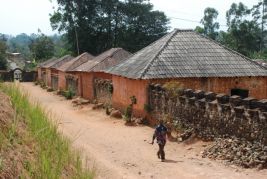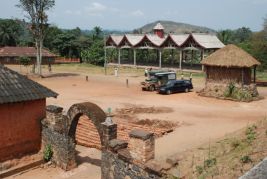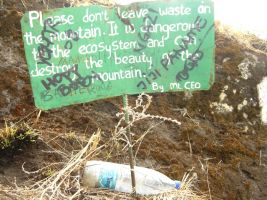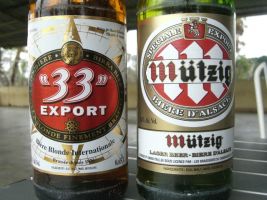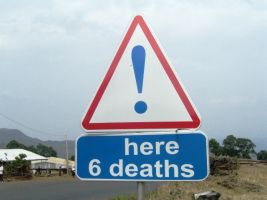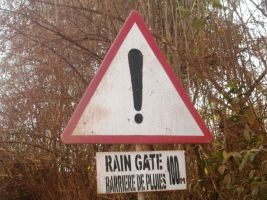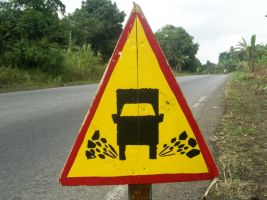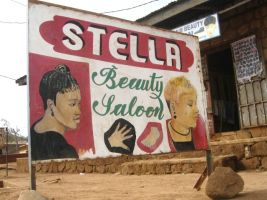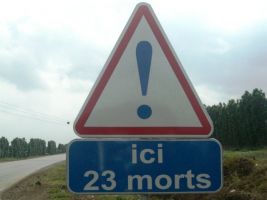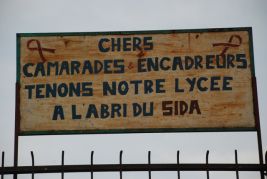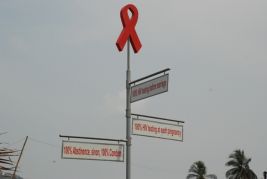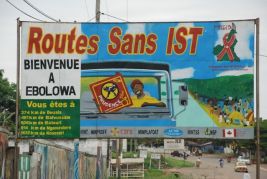
 Italia
Italia France
France Spain
Spain Morocco
Morocco Mauritania
Mauritania Senegal
Senegal Mali
Mali Burkina
Burkina Ghana
Ghana Togo
Togo Benin
Benin Nigeria
Nigeria Cameroon
Cameroon Gabon
Gabon Sao Tomè
Sao Tomè Gabon 2
Gabon 2 Congo
Congo Congo DCR
Congo DCR Angola
Angola Namibia
Namibia Sud Africa
Sud Africa Namibia 2
Namibia 2 Botswana
Botswana Zimbabwe
Zimbabwe Botswana 2
Botswana 2 Sud africa 2
Sud africa 2 Swaziland
Swaziland Mozambico
Mozambico Malawi
Malawi Tanzania
Tanzania Rwanda
Rwanda Uganda
Uganda Kenya
Kenya Etiopia
Etiopia Sudan
Sudan Egitto
Egitto Libia
Libia Tunisia
Tunisia Malta
Malta
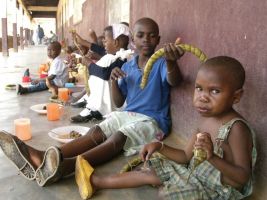
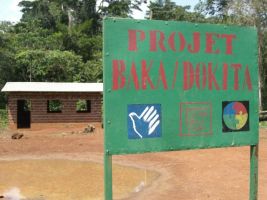
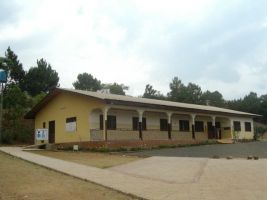
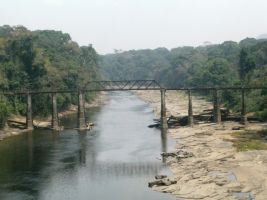
Here we are in Cameroon – 4 March 2008
We cross the Cross River and we are in Cameroon. Straight away, we encounter a huge pothole a metre deep announcing the type of roads we are likely to encounter.
Usual procedures at Customs and police offices are quick and easy.
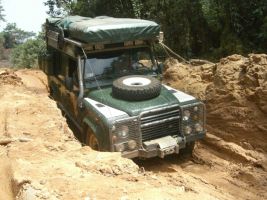
This road is known as "the worst road in the world”, for over 60km its surface is covered with huge gaping cracks. With the rain, potholes become proper swimming pools, 3 metres deep and 30 metres long.
Fortunately, this period is still very dry and any rain is soon absorbed. We are faced with only a muddy road.
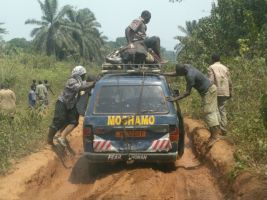
We are in a hot tropical forest where we are bombarded by mosquitoes and other small unidentified flying objects that keep biting us.
Buses carrying passengers ever hopeful of reaching their destination in one-piece stop at every pothole, they get off the bus and push. We do not know which is more efficient…the bus carrying the passengers or the passengers pushing the bus, but together it all keeps moving.
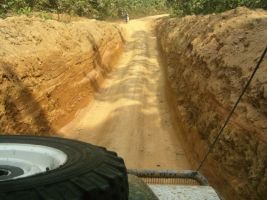
It is not enough!
We get to Manfè quite early and decide that the last 60km of Camel Trophy are not enough. We continue with the next 110km; the road ahead is the same, if not worse. The car is heavy with fuel so we advance slowly.
The potholes filled with dry mud make the conditions worse, the vehicle twists and keels putting the suspension under a lot of stress.
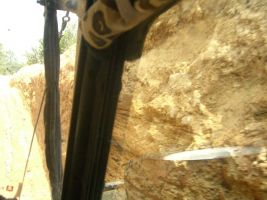
Widikum
At 4:15 p.m., we are entering Widikum, one of the many villages found on this trans-African road. Between May and November locals find it almost impossible to travel along this road, and do so only when necessary for medical emergencies.
We still have a couple of hours ahead of us, when we spot a large well-kept building. It is a hospital-dispensary and we stop to ask them if we can spend the night inside their enclosure.
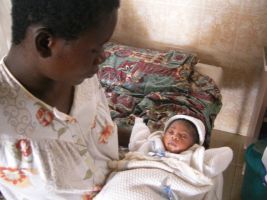
The Spanish nuns who run this hospital, situated right in the middle of the forest, welcome us. Once just a dispensary, this hospital now has an operating theatre, a maternity ward with an educational programme for mothers. There is also a department for HIV, where huge efforts are made saving those children whose mothers have been diagnosed with it. The children are given artificial milk, which is very expensive. We decide to leave an elfo token towards the cost of the milk (see more in the solidarity section).
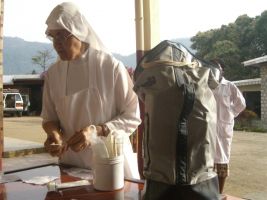
At the moment, a dispensary is opening in Menka, a remote village 25km inside the forest. It is reachable only with the help of a local guide.
Every two or three days a motorcycle courier delivers medicines and supplies there.
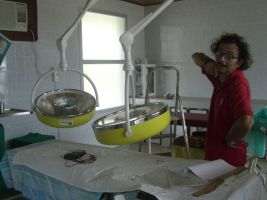
Next day before setting off, we decide to pay a visit to the hospital. We are told that in the operating theatre a normal light and torch are used during operations, as their double operating-table lamp has been out of service for some time, since a local technician dismantled it whilst trying to change a bulb and has left it in pieces.
We try to be helpful by giving the lamp a go… after all, it is only a lamp! After a spending the best part of the day, we find several problems, but without spare parts, there isn’t much we can do. We are very disappointed.
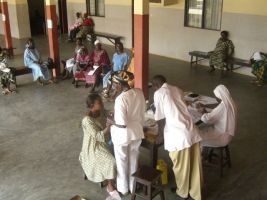
Whilst we are there, a little girl is taken in. She is very poorly, it seems that a local witch doctor has made things worse trying to cure her by giving her a potent cocktail, which has perforated her stomach; they are unable to save her.
At five o’clock in the morning, we are awakened by an excruciating noise. It is a woman, who at first sounds mad or just drunk. However, these cries are of desperation. We cannot tell if the noise is from the street or in the hospital.
The next day we learn that the woman’s child died in her arms. A few days before, the baby was admitted to hospital with hemoglobin five. He had spent seven hours traveling in a fruit basket on his aunt’s head who walked with them to the hospital. Seven hours of jolting, high temperatures and mosquitoes… the baby was a few days old, the mother only 15 years old.
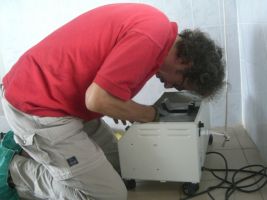
It isn’t easy leaving this place; we feel so desperate to offer them some help wherever we can. You feel helpless; we look for other pieces of broken equipment to repair. We find among other things a set of electronic baby-weighing scales. But, we wind-up the same, even though this time we have a manual, without the necessary spare parts there is little we can do. Regretfully, we realise that the real problems here lie elsewhere, we feel frustrated and restless... impotent.
This is Africa and these very costly machines are rendered useless by the simple lack of spare parts… things we take for granted but here, impossible to find.
APPEAL!
Help is needed immediately and right now, there is an urgent need for a doctor, a surgeon, an electrician and a technician. Whoever wishes to spend a month here to help is very welcome. Board and lodging will be paid by the hospital and travel expenses are paid by ELFOavventure.
Please do help.
GPS N5°51.725' E9°45.920'
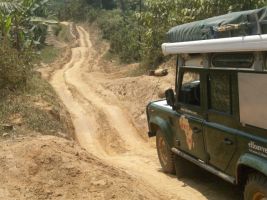
Back on the road - 6 March 2008
We bid a tearful goodbye to the nuns and leave behind a little bit of our hearts. We hope to be able offer help by getting someone here through our appeal. The journey continues…
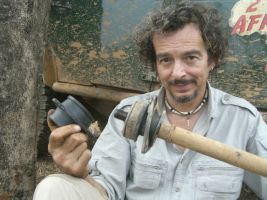
The roads are getting no better and as we get to the asphalted road of Batibo K7 suddenly starts to screech and waver about at every touch of the brakes and accelerator. One of the “new” bushes fitted in Ghana by Pit Stop has just disintegrated…
Our experience with the mechanics in Ghana has been very negative. We now need to look for a spare part; the price of which is 5.000 CFA, if you’re a local; if you’re a tourist then it’s 25,000! Eventually, we manage to bargain at 15,000.
I decide to order an extra one, as I expect the left one will let us down too!
We find a another guy who deals with and restores the Land Rover 88 and 109, he is willing to let us have one for just 10,000CFA.
We camp in the garden of the Presbyterian mission in Bamenda.
Gps N5°58.069 E10°09.130
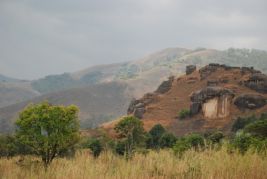
Ring Road – 8 March 2008
The ring road is 367km of dreadful road with beautiful panorama. It leaves the city and then circles around a range of mountains that are up to 3,000 meters high. Because conditions at this time of year are favourable, we decide to drive further up where the road is in better condition.
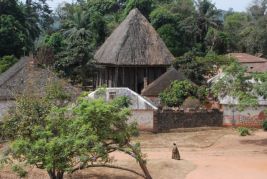
Bafut – 8 March 2008
Bafut hosts the Fon palace, the king’s palace.
This is a place of witch doctors and healers, where the people are very superstitious and pay homage to the spirits. The most powerful men live with their dozens of wives in their characteristic houses where they hold hearings. During these hearings, they pass judgment on crimes and settle disputes. In some cases, it seems they have the power to decide over life or death, acting independently from the government. It costs 6,000 CFA for the two of us plus our camera.
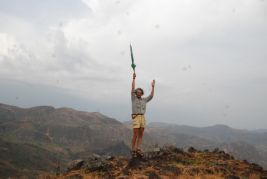
Some of the roads have gradients of 10%, therefore we need to use very low gears, unfortunately, this gradient proves to be too much and not even the advice of McDaniel to tie the gear lever to prevent it jumping out of gear works.
It is raining, heavily. Nevertheless, we decide to go on foot and attempt the almost suicidal 20-minute walk up the hill in torrential rain.
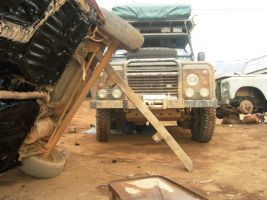
Thankfully, our suicide attempt fails.
The Land Rover restorer who robbed me the day before with the sale of the new bushes, puts things right quite quickly. If you do need a Land Rover mechanic, these are the co-ordinates: N5°57.915’ E010°08.965.
Here, mechanics who work on Land Rovers could be classified as “restorers”. Ours, at 20 years old is probably the most recent one around! Land Rovers here are mostly 88 and 109 models and it has to be said, they are impeccably restored. If you could export them to Italy, you would make a lot of money by selling them to collectors and enthusiasts.
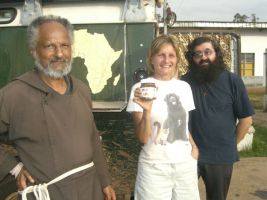
A pleasant surprise! A nice and safe place to spend the night and a delicious gift from our host Brother Gianluca.
In this mission of Bambui monks, we meet many interesting people with a wealth of experiences. They have been witnesses to intense desperation. We spend a few hours listening with great interest to their stories. We have tried to recount some of these stories in an attempt to relay to you, the emotions that we felt hearing them.
A story from the prison
That morning Assan didn’t eat. The miserly breakfast, always sought after, couldn’t be swallowed, his sore, painful throat swollen through his incessant sobbing.
We found Assan crying in a corner of the room. His young face wet with tears, a pitiful, woeful face of a child lost. He is afraid, he is alone and he is in Bamenda prison. I go closer and try to console him. We are strangers in so many ways, nevertheless, the slightness of these differences fade into insignificance; we embrace and perhaps, if only for just a moment I ease his pain, bring him solace, reassurance and understanding.
It is not his turn to have a bed; therefore, for a little while, we sit next to each other on the floor of this huge room for underage kids. There are around sixty teenagers between the age of 12 and 18, and only thirty beds. You need to take turns or sleep together. With this overcrowding and an atmosphere of promiscuity, there is a high level of sexual abuse. It is probably no better in the adult room, there, there are no beds, people sleep on the floor or on cardboard boxes. If you can bribe a guard or an older prisoner, you could get a mattress.
Abuse of power is rudimentary behaviour amongst the prison guards with many tales of ill-treatment and torture; this is also evident between inmates. Abuse and torment are part of everyday life and a reality that every inmate must face.
Assan cannot resign himself and through uncontrollable sobbing, he repeats over and over that he wants to go home.
His crime was stealing a gas bottle. Gas bottles are stolen as their shape and material are ideal for making into pots and pans; children sneak into houses where locks are practically non-existent, take the bottles and then pass them on to be re-modelled into pots and pans that will then be sold on the market. There is good money to be made and the risk of being caught is down to the children who take the bottles. This easy way of making money attracts many kids, transforming them into little thieves.
Three kids acting together committed this particular incident, but only Assan was caught. However, he should consider himself lucky, as lynching is a very common practice in many African villages. Usually, by the time the police arrive on the scene it is often too late. Sometimes when captured, the unfortunate person is beaten and then bound by a car tyre. With their arms unable to move, they are subjected to further beating and are showered in gob and spit. Then, this already horrendous scene of vigilantism takes a horrific turn, as the victim still bound by the tyre is doused in petrol; the rest I leave to your imagination.
In this prison there are around forty women, many with small babies at their breasts; prisoners without crime, these little ones live their first months or sometimes even years without freedom.
At times, the prisoners are taken outside for fresh air. Bamboo posts fence the courtyard, as the new high wall crumbled during a downpour. Weak foundations made with too little cement was probably the cause, it is common that funds for such constructions end-up elsewhere, forcing cutbacks on materials. This, though, is not a worry for the guards, as they have precise orders to shoot the legs of an escaping prisoner (when the aim is good). Nobody thinks about climbing over. Only during very foggy mornings could escape be a possibility, but when this is the case, time in the courtyard is suspended.
It is not easy to console a 12 year old who wants to return home, when the reality is very different. He is awaiting trial, a period that could last for years, as much as three or four, by which time Assan will be 16years old. After that, if he remains in prison or is set free, it will not make any difference, as by then he will have surely learnt to hate and take from those weaker than he and take liberties like those taken from him to obtain whatever one needs, no matter what, without propriety.
Perfect!
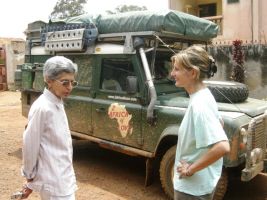
Maria Negretto – 9 March 2008
Despite her Malaria attack, which today has made her particularly weak, Maria welcomes us into her home in Bafoussam. She is tall and slim with short white hair. She rarely gives away a smile; but when she does, it is a personal gift.
Maria used to be a ward sister in a Rimmini hospital, until one day, she decided to come to Africa as a volunteer; that was forty years ago. Today, she is as active and involved as she has ever been and has become very well known and highly respected for her hard work and dedication. She is nothing short of a national treasure for all she has done in and for the Cameroonian community.
A particular impressive and most striking initiative is the centre she runs for HIV positive. That is the reason we are here, however, today is Sunday and a visit today will not be possible. She tells us the story of Laolen, a four-year-old child. We decide to help by leaving a small Elfo token (details in the solidarity section).
Maria is still so full of energy and great ideas; one idea is to launch a local radio station with programming designed to educate people. The only official radio station broadcasts music and propaganda. For sure, she will make it happen.
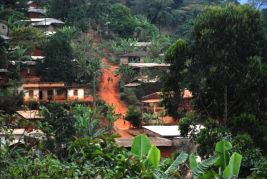
Towards the ocean
We drive on towards the sea. It is hot and humid and the scenery is a strange mix of pine trees and banana trees side by side. The roads are good but the many roadblocks hamper progress. After a little time spent just chatting, they let us go (more often then not, without asking to see our documents). On the road, you need to pay attention to the huge Lorries that transport big tree trunks. They whiz along dangerously without slowing down.
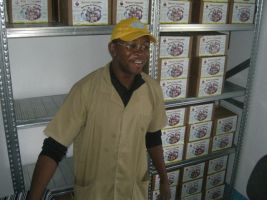
Biscuits 4 love…- 9 March 2008
Baking biscuits for Africa, now that’s a good idea! Pierluigi thought of it a few years ago. He was born in Rovereto di Trento and became an expert on food production machines.
In Nkongsamba, “Biscuit Children” was set up with help from "Children Care Cameroon”. He built and set-up the small factory, imported the machines and employed a dozen or so local workers that now produce nutritious children’s biscuits.
Creating employment in a country like Africa is a very good thing to do but, in this case, the importance of the project lies elsewhere.
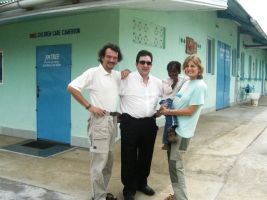
The biscuits are sold to small retailers on the streets at a cost that barely covers the raw materials and labour. Any unsold goods are given to orphanages, schools and hospitals free of charge. We like the idea.
We offer an Elfo token for the initiative, but Pierluigi categorically refuses it. He prefers to have an Elfo contribution if things get tougher. As a sign of solidarity towards our Elfo project, Pierluigi gives us two packets of biscuits and an industrial quantity of pasta, a gesture too good to refuse; thank you again Pierluigi.
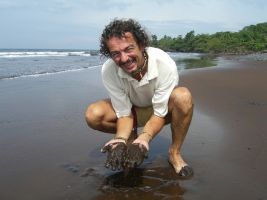
Limbe 10 March 2008
Limbe is famous for its black beaches. The black sand is a result of volcanic ash from the still active volcano Cameroon. In 2001, the volcano erupted, sending a shower of molten lava and ash cascading into the sea 4,000meters below.
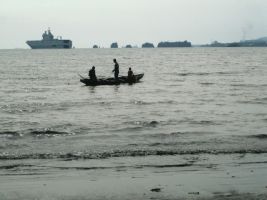
Around here the sea is abound with fish. The Chinese know it well and fish here aplenty. The locals are upset but it seems there is little they can do to stop it. No one is sure if they are here illegally or if they are here in cahoots with the rather complaisant government.
There is a French military ship anchored in the bay with a helicopter. The locals like to believe that their presence is to help rid them of the smuggling Chinese fishermen; however, the French military insist they are just keeping an eye on drug trafficking. This military presence is no doubt a huge comfort to the many French citizens who reside in Senegal and Cameroon, but as well as security for some, for others it is a source of apprehension. We cannot help but wonder whether this presence and the feelings of dissension towards it had something to do with the trouble a few weeks ago; we inquire no further.
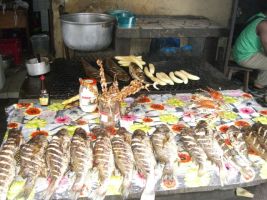
For a few euros, we polish off a delicious fish dish. Freshly caught, cooked and served hot without cutlery. The waitress sits at the table with us and tells us that she works seven days a week for 10,000 Francs (about 15 euros) a month. For that, she could buy four of these fish. She is lucky to have this job… and tells us how much she would like to come to Italy with us.
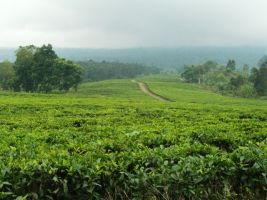
The call of Mount Cameroon
How can you possibly drive in the shadow of a 4,000-meter high mountain and not want to climb it? Impossible…it’s there! Especially, if the mountain happens to be an active volcano; and, you can do it without specialist equipment; and, it just so happens to be the highest in West Africa. Nope, I’d say it just has to be done!!
So, off we go to Buea, at 900m high and the beginning of the path. For the past few days the weather has been cloudy, therefore, we have not seen the top of the mountain yet. Before we start, we give a thought to our fitness; we have been sitting-down in our Land Rover quite a lot over the past five months, so a question mark certainly hangs over our level of fitness; we decide to throw caution to the wind and give it a go!
Two agencies provide permits; one is government run and more expensive than the other private one. There are options available from two to five days. The majority of people make the climb in three days, but we opt for two days, along the “Guinness way”… “The athlete’s choice”.
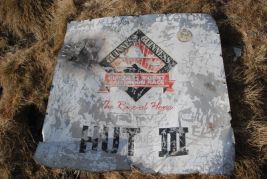
Race of Hope – Mount Cameroon 4,095m
Every year in January, along this path, there is an uphill marathon called the “race of hope”. There are roughly 500 participants from all over Africa, usually no more than half finish the race. During the up and down hill course, they will climb 3,200m. Our guide is Paul and he loves running; his personal record is an athletic four and a half hours.
He cannot believe that in Europe and throughout the developed world runners have to pay to compete in such events. Here the organizers ask for 2,000 francs for enrollment (about £2), but after the race, each competitor receives 10,000 francs (£12) - whether they finish or not! With an expression of someone who is stating the bleeding obvious, Paul tells us, that no one would otherwise come to run - a concept that he personally cannot understand because he just likes to run, even when there is no prize money for the winner. However, in this race there are prizes for the first 50 with the winner taking a rather hefty 3 million francs, that’s nearly 4,000 quid…Unbelievable!
Mount Cameroon – 4,095m - The Guiness Way
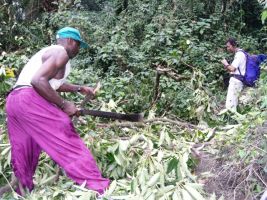
Uphill going – 13 March 2008
It is 7:30, just after dawn. With Swiss precision, Paul and Mario, the carrier, present themselves at the guesthouse where we are camping with K7. Tomorrow, Mario will take our tent, sleeping bags and bottles of water. We do not trust the bivouacs situated along the course, described by some as filthy, therefore we have opted for light emergency tents. Paul, our must have guide, is ready but Mario does not have his rucksack. He was expecting us to supply him with one (wherever did he get that idea?). At least he has shoes, which is something; however, he goes back to the town and after only 20 minutes, he is back with a bean sack in hand. This once sack for beans, will be filled with our stuff and then he will carry it on his head… We leave with the usual 10-12 kilo rucksack!
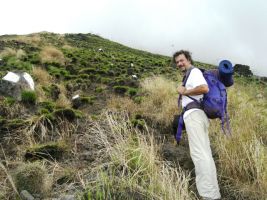
8:00 start at 950m above sea level. We enter the fog covered equatorial forest where the atmosphere is very muggy. The humidity and sweat run down our faces drenching our shirts.
At 10:10, we pass the first shelter at 1,650m. Here, is the only provision for water during the uphill. The locals use it but, to us, this puddle of dirty water is not very appealing; we would rather keep our three bottles. We have a water purifier with us but still, we prefer not to use it… We continue.
At circa 2000m above sea level we are suddenly out of the forest.
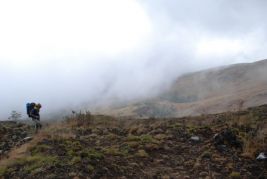
We find ourselves at a steep bank of lava-rock. There are the remains of large trees scarred and laid bare by the fires. After the fires that raised this forest to the ground had ceased, all that remained was a scarp of lava-rock.
We are nearly above the clouds; the wind is strong and blowing them further towards us. From here, the path becomes very steep, punishing, and unforgiving.
13:30 and we are now 2,850m above sea level and at the second shelter. There is lovely sunshine occasionally obscured by the clouds on the move and made restless by the wind.
In five and a half hours, we have climbed 1,900m. Considering our lack in fitness, we feel pleased and are well satisfied.
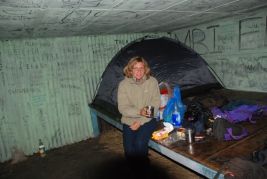
Here comes the night – 13 March 2008
The bivouac, surprise, surprise is in poor condition. Outside, the wind was showing no signs of easing so we decide to set-up the tent inside the wooden partition.
A cold dinner follows with the company of mice scurrying about our feet attracted by the smell of our food. We are welcome visitors, so much so, that throughout the night, they won’t leave us alone. It seems the word is out, mice are now all over the place, climbing over the tent, burrowing under the basin and finally finding famine relief in the form of Mario’s food… We hang our rucksacks on high nails in an attempt to save our supplies… A difficult night.
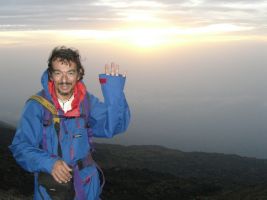
The summit-14 March 2008
Alarm call at 4:30 in the best alpine tradition.
Outside it is dark, windy and cold. We are expecting height differences of 1250m along this next section.
These are the occasions when you ask yourself, like Bruce Chatwin “what am I doing here?”
However, once you awaken and stir the motivation from who knows where, suddenly, you’re ready and willing.
Gloves, hat, lamps at the ready and we’re off again. It is 5.15.
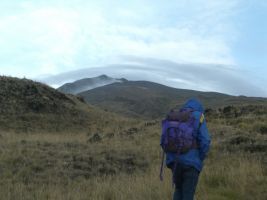
After an hour the sun rises. We are lucky with the weather, there has been some lighting out towards the sea but here on the mountain all is well. We keep thinking we can see the summit but they are all just pre-summits.
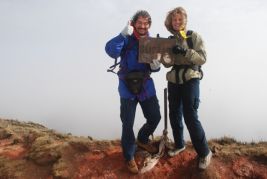
We will reach the summit in around three and a half hours. At 8:45 despite the height, we are satisfied the height differences have eased off as the path starts to even out. The sun is out but it is not very warm, around two degrees Celsius, the wind chill increases the sensation of cold. Finally, at 4,095m, 30m higher than the Gran Paradiso we are at the summit. A few minutes to catch our breath; meanwhile, the rolling clouds shape the panorama in a continuous and casual sequence… Some photos and we are on the way down.
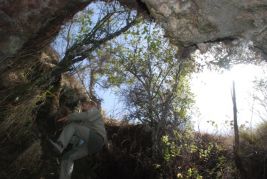
It's all downhill-14 March 2008
It is now 9:00 and we begin our descent. Level differences of 3,150m, all downhill. Along the path, there are gaps, holes, small caves and caverns. Buried volumes of gas formed these indentations when the lava was still burning. Some small quantities of gas towards the summit are still active; hot vapour escaping out of them. Others, lower down are proper caves. At 11:20, we are at the same shelter as last night. All is well for now and time for a short thirty-minute break. We have a small bite to eat and then we are off again towards the K7, 1900m below.
On the way down fatigue and tiredness are beginning to show, nothing too serious, but the last five months sitting and travelling inside the car have weakened our muscles and our legs are starting to feel the strain. We have to slow down. We finally arrive at the guesthouse Presbiteriana at 17:15
GPS N4°09.694’ E9°13.976’
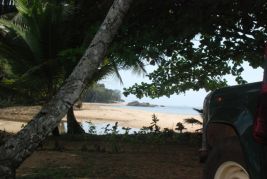
Now for a well deserved rest! - 15 March 2008
They say that the beaches in Kribi are white when in reality they are golden; however, one thing is certain, this place, with its palm trees and mangroves is very beautiful. This beach is one of the most famous in Cameroon. The sea is hot and quite calm.
After the climb, it is time to relax at the Tara Plage, a beach side restaurant with camping facilities.
GPS N2°54.343’ E9°54.108’
During the night camping by the sea, we witness a spectacular downpour. It is the first time we have experienced a downpour like this with our tent open, so far it has only rained like this during the day. This is a good test of how strong and watertight the tent is… guess what? It isn't! Rain is getting inside… the mattress and everything on it is wet (I have a few choice words for ‘4technique’ of Modena, who sold it to us as absolutely sound). The storms here usually last about an hour, before the sun is out again to dry everything. Unfortunately, we have to pack-up and leave closing a wet tent, in a day there will be mildew.
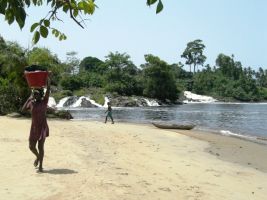
The Lobè waterfall, falls straight into the sea and is within an hour's walking distance along the beach. The waterfall is often used by the women of the village to freshen-up and to do the washing. Whilst we were there, shrimps were on offer from the men of the village.
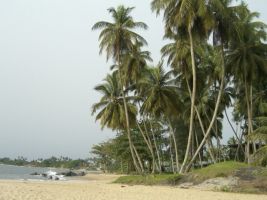
Goodbye Mauro!
From our campsite, we walk 7km along the shore to the village.
Upon our arrival, we find out some terrible news. Whilst we are online at the village internet point, we learn of the death of our dear friend Mauro in Nigeria; we are devastated.
We decide not to update the website; it is so difficult to accept that our dear friend has gone – everything seems so pointless. We try our best to come to terms with what has happened struggling to continue with life’s mundane chores.
It is local tradition to celebrate the passing of someone’s life. We do not feel up to celebrating but decide to go to a restaurant; one a little more up-market than one we would normally choose. This is how we want to say goodbye to Mauro. Life is short and we feel this is a fitting way to honour our friend… and he loved the good things.
Taxi driver
It is dark and for security we are advised to take the return 7km journey by taxi. These are usually moto-taxis, tricycles that can take two to three passengers. They should cost between 300 and 500 francs to our beach campsite.
We stop a moto-taxi and the driver tells us that he cannot take us because the beach is outside the city and the police who patrol the road will ask for a tip to let him pass, making it non cost affective. We have to go to the ‘authorized’ taxi rank that operate a monthly ‘kickback’ scheme. They are situated at a crossroads towards the centre and will cost around 1000 francs.
Whilst we are walking to the taxi rank, a normal taxi stops. The driver asks for 4000 francs for our journey. We refuse, we haggle and we agree 2000 francs - he tells us that the police will ask him for 1000 francs. As we exit the city and head out into the darkness, we see a bright light up ahead indicating that we have arrived at a police checkpoint. Our taxi driver gets out of the car, speaks with the police officer, and gives him something. After a further 2km, we are faced with more torches flashing in the dark. This time it is the gendarmerie. Our taxi driver seems agitated… he gets out… they talk. He gets back in, moves the car to the side of the road, and switches the car off. “Well? What’s happening?” I ask. He tells us, that he has been asked for another 1000 francs and so he will not make any money… I get out and talk to the gendarmeries. I can barely see them in their dark green uniforms. I ask what problems there are and I am told that the taxi driver does not have any documents. Who knows what the truth is? Is the taxi driver playing the victim trying to inflate the price? Are they in cahoots? I decide that the answer is no longer important. Laura gets out of the taxi; we give 1500 francs to the taxi driver and decide that we will carry-on on foot. There are only 2km remaining and we feel we are in a safer place… outside the city... in the forest? We start walking and pass a group of girls singing, a little further we are aware of a light from behind us; it catches up… it is the taxi driver. He tells us that he cannot allow two strangers to venture alone in the dark and that he told the gendarmeries that if something happened it would be their fault and that instead of generating security they were putting people at risk; therefore, he will take us the rest of the way. We get in and in a few moments, we are at the Tara beach, we settle-up for 500 francs.
I’ll leave the conclusions to you…
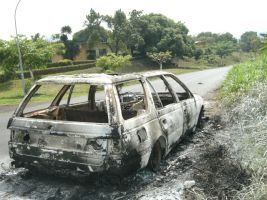
Misery and Disorder
Along the roadside there is still evidence of the riots a few weeks ago - burnt-out cars lying by the roadside. Basic necessities have been in short supply with those available greatly inflated, this inflicted much misery and frustration. All this coupled with further increases in fuel lit the fuse. Taxi drivers went on strike and from there widespread rioting.
As often happens, during chaos anything can happen, in particular, the plundering and pillaging of anything from beer dispensers to more valuable goods. Some cities were completely closed off. For a whole week, it was impossible to move around, the smartest thing to do was to lock yourself at home.
Then, after a few promises from the government, an adjustment in fuel prices and a good dose of police discipline everything was resolved…for the while. There is more dissension in the English-speaking part of town and there is a strong feeling amongst them that the days of the current presidential dictatorship are numbered. The president has been in power for 25 years and within two years, he could see the end of his rule. He and his supporters are trying to change the constitution to transform the term of government to a permanent one. A great part of the population does not want this but the multinationals trading in coffee, fruit (bananas and pineapples) and wood still want him in power. The future of Cameroon I am afraid, is predictably one of bedlam and pandemonium.
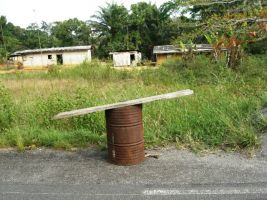
The first oil-drum
The first oil-drum has a plank of wood perfectly balanced across it. On the plank, there are the goods; bananas, yams and potatoes, sometimes there are tomatoes and plantains or a few pineapples. The display is eye-catching and conveniently the height of a car window, its height helps keep it clean from the dust and it is visible to the cars passing by, hoping to entice a passing driver to make a purchase.
The first oil-drum, forsaken and discarded by the workers of the road is given a second chance, its usefulness restored.
The first oil-drum is an acquisition. A business opportunity that brings hope and bread. Inventive and resourceful.
The first oil-drum brings work.
The second oil-drum is an add-on... extra. The second drum does not duplicate the importance of the first. It does not increase the income of the evening. It does not bring more bread nor anything to go with bread. It is vanity, bringing consolidation to the situation. It gives added comfort that does not really change anything but everyone searches for it.
The third oil-drum is excess. It redoubles the area and the goods. It is sovereignty… It is bigness.
The third oil-drum could be a boon, it would be enough to leave it to a neighbouring vendor so it could become his first oil-drum.
Yaoundè the Capital – 20 March 2008
First of all the visas for Gabon from the embassy
GPS N 03° 53,665’ E 011°31,166’
The embassy closes at 15:00 and after an hour of traffic we finally arrive. We fill in the module and hand in our passports, a photo and 50,000 francs each. They will be ready tomorrow, if we want it before, we have to pay 20,000 francs… tomorrow will do.
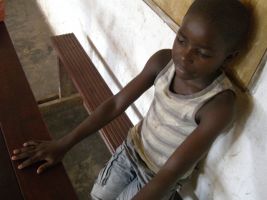
Prohandicam
The Prohandicam Centre welcomes every adult and child with physical disabilities. Set-up a few dozen years ago following a terrible epidemic of polio (poliomyelitis), it has continued to develop and now has a school for the blind, with the addition of a Braille printing facility and physiotherapy department. It has become one of the most important centres of the country. There are also other facilities such as traditional and professional schools for carpentry, needlework and mechanics where tricycles are made for the disabled. Father Sergio from Trento runs and organizes it with great ability.
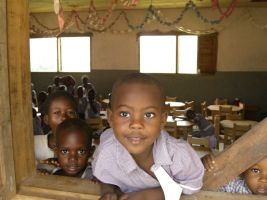
He tells us of a non-religious centre in the forest run by Leo. He is setting-up a school for pygmies (members of a certain peoples of very short stature in equatorial Africa or parts of SE Asia). We decide to offer an Elfo-token for the purchase of desks and blackboards (details in solidarity).
He also talks to us about Isabelle Ze, a local girl who has opened an orphanage in the forest about 300km from the capital. We spend Easter with her.
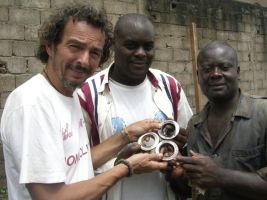
Back to the mechanic!
The rear differential oil seal is leaking. The mechanic recommended to us, swears that he knows Land Rovers inside out. He takes us to his garage, which alarmingly is nothing but an empty gravel courtyard with not a tool in sight. He tells me where to park and asks me to disengage the four wheel drive; this tells me straight away that he knows nothing about Land Rovers – 90/110 and Defender have permanent four wheel drive with a centre differential that can be locked for off-road use but cannot be disengaged; I will have to watch this chap very carefully.
We remove the oil seal and I search for the new part; obviously, I have with me every single type of oil seal… except the one we need.
The search lasts all afternoon and all of the following morning. We move around in the city by taxi and moto-taxi. No one here sells Land Rover replacement parts. We did manage to find a rusty oil seal for a ludicrous price but continue our search. Finally, we find one. It is still in the plastic but appears to be made of another type of metal - probably a clone from the Far East. We try, try and try again to fit it but it does not fit. It is the same in appearance, but it just does not fit. We try to find another one and eventually come across another one in a packet but this time it has an “original Land Rover parts” sticker, it is a bit rusty but we decide to give it a go. This time success, a high price but we have done it.
Whilst working underneath the car we realize that a joint to a silencer is rotten. We dismantle it and have it sorted by a local blacksmith. I also notice that the bush mounted in Ghana is breaking-up, so we replace that as well.
After two days, the car is fit and ready for more action.
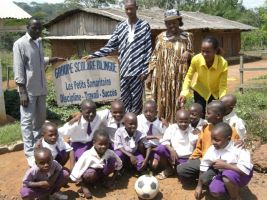
Djoum – 23 March 2008
It is 300km to Djoum; the roads are a mix of asphalt and dirt track. We meet Isabelle Ze and her orphans at the orphanage. She has done a truly fantastic job and almost on her own. We leave some school material, a ball and we donate two Elfo tokens (details in solidarity).
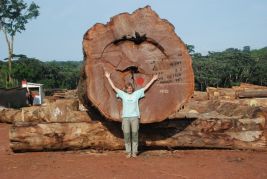
Daniel from France is one of the few people who help her. He has been in Africa for 35 years; he runs a business that exports wood all over the world. His sawmill employs around five hundred locals that is about 80% of the employment in the area. He explains to us that they cut down 35 different types of trees. In the designated areas, they can only cut down one tree per hectare after which, legislation prohibits any further cutting for thirty years in that same area.
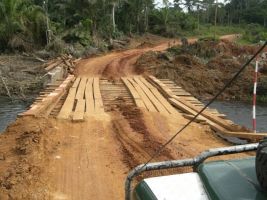
Towards Gabon – 25 March 2008
The rain has fallen heavily during the night and has made the track towards the frontier very slippery and muddy but with our moderate speed we arrive safely at the border. With helpful gendarmeries and customs officers, we rush through the formalities in few minutes.

Our Impressions
A population that are on the whole relaxed, despite the mess made by the colonizers responsible for dividing the country into its English and French speaking parts.
The asphalted main roads are in good condition. Off the main roads, many dirt tracks are in very poor condition. Roadblocks are frequent with groups of gendarmeries, police officers and municipal guards. It is common knowledge that at these roadblocks there are many who solicit tips, although we didn’t experience this directly.
For the first time since we left, we found shops fully supplied with all kinds of liquor.
We noticed, that by comparison, there are a large number of albinos
